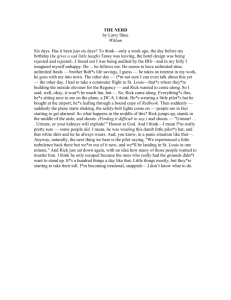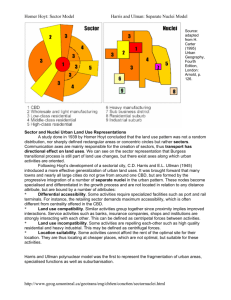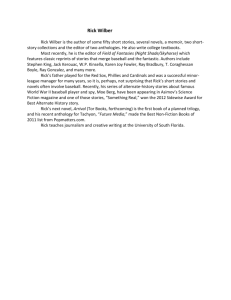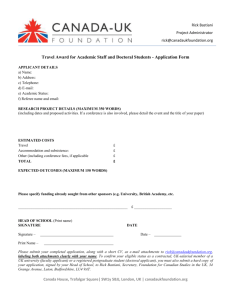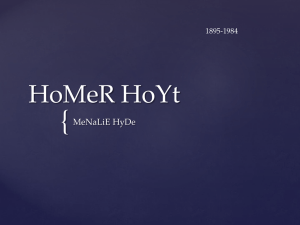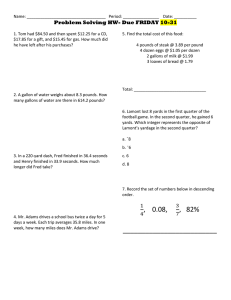The dynamic duo E
advertisement
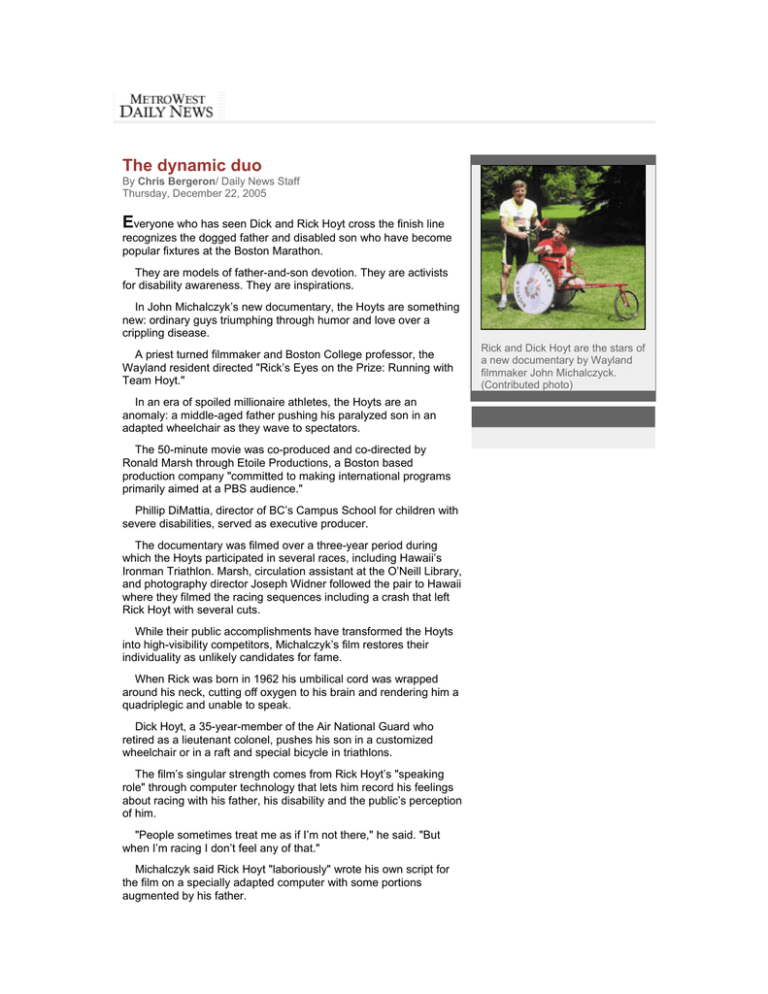
The dynamic duo By Chris Bergeron/ Daily News Staff Thursday, December 22, 2005 Everyone who has seen Dick and Rick Hoyt cross the finish line recognizes the dogged father and disabled son who have become popular fixtures at the Boston Marathon. They are models of father-and-son devotion. They are activists for disability awareness. They are inspirations. In John Michalczyk’s new documentary, the Hoyts are something new: ordinary guys triumphing through humor and love over a crippling disease. A priest turned filmmaker and Boston College professor, the Wayland resident directed "Rick’s Eyes on the Prize: Running with Team Hoyt." In an era of spoiled millionaire athletes, the Hoyts are an anomaly: a middle-aged father pushing his paralyzed son in an adapted wheelchair as they wave to spectators. The 50-minute movie was co-produced and co-directed by Ronald Marsh through Etoile Productions, a Boston based production company "committed to making international programs primarily aimed at a PBS audience." Phillip DiMattia, director of BC’s Campus School for children with severe disabilities, served as executive producer. The documentary was filmed over a three-year period during which the Hoyts participated in several races, including Hawaii’s Ironman Triathlon. Marsh, circulation assistant at the O’Neill Library, and photography director Joseph Widner followed the pair to Hawaii where they filmed the racing sequences including a crash that left Rick Hoyt with several cuts. While their public accomplishments have transformed the Hoyts into high-visibility competitors, Michalczyk’s film restores their individuality as unlikely candidates for fame. When Rick was born in 1962 his umbilical cord was wrapped around his neck, cutting off oxygen to his brain and rendering him a quadriplegic and unable to speak. Dick Hoyt, a 35-year-member of the Air National Guard who retired as a lieutenant colonel, pushes his son in a customized wheelchair or in a raft and special bicycle in triathlons. The film’s singular strength comes from Rick Hoyt’s "speaking role" through computer technology that lets him record his feelings about racing with his father, his disability and the public’s perception of him. "People sometimes treat me as if I’m not there," he said. "But when I’m racing I don’t feel any of that." Michalczyk said Rick Hoyt "laboriously" wrote his own script for the film on a specially adapted computer with some portions augmented by his father. Rick and Dick Hoyt are the stars of a new documentary by Wayland filmmaker John Michalczyck. (Contributed photo) In the movie, William Bobrowski, who’s roughly the same age as Rick Hoyt, provides his voice. While Rick Hoyt’s disability has rendered him the less vocal of the two, he emerges -- through Bobrowski’s reading -- as observant, matter-of-fact and just as determined as his hardcharging dad. "You can only imagine the experiences I’ve had competing with my dad," he recalled. "He’s always been there for me." The documentary makes that clear. After his son’s birth, Dick Hoyt remembers a doctor saying as a result of cerebral palsy his son would be "nothing more than a vegetable." "We decided to bring Rick up like any other child," he said. Totally paralyzed, Rick Hoyt was unable to communicate until 1972 when he received a specially adapted computer that allows him to write by using face muscles. While his parents wondered whether his first written word would be about either of them, Rick Hoyt outdid them both, writing "Go Bruins." In 1975, Rick Hoyt was admitted to public school. Two years later, at 13, he convinced his father to help him participate in a fivemile benefit run for a local lacrosse player who had been paralyzed. Although they finished second-to-last, that night Rick told his father he "didn’t feel handicapped when we were competing." In 1981 they took part in their first Boston Marathon, running "unofficially" behind the wheelchair racers. Over the last 24 years the Hoyts have participated in more than 900 competitions, including 26-mile-long marathons and grueling triathlons that involve swimming, bicycling and running. They have completed in 64 marathons, including 24 consecutive Boston Marathons. Their best time is 2 hours and 40 minutes. "We’ve come a long way and broke a lot of barriers," Rick Hoyt said. "I don’t feel sorry for myself. I just want to be fully involved." Rick Hoyt speaks movingly of his father: "My dad is more than my arms and legs. He’s my spiritual center." Now 65, Dick Hoyt, who lives in Holland, Mass., continues to train for marathons and triathlons. A former Jesuit priest, Michalczyk said he became interested in filming the Hoyts’ story after seeing them talk about racing to students at Cambridge Rindge & Latin School. The chairman of BC’s Fine Arts Department and co-director of film studies, he said his goal was "to show the normalcy of disability." "Making this, I felt very close to understanding what it means to be disabled and unable to speak. Rick inspired us with his sense of humor and intelligence," he said. The movie is part of the "I’m Here" documentary series by BC filmmakers that tells the stories of people with disabilities. Michalczyk previously made "Michael’s Eagle Eyes" about Michael Nash, a Marshfield resident who uses computer technology to communicate after 14 years of total physical paralysis. He’s editing a film to be titled "I Am Claudia" about a deaf child in Nicaragua who overcame poverty to become a teacher. Michalczyk is in negotiations with local television WGBH to screen the documentary. The documentary fleshes out Rick Hoyt’s determination outside of racing. After nine years, he earned a degree from Boston University and now lives in a Boston apartment by himself with help from personal attendants. He works part time at BC’s Campus School helping develop computer technology for disabled users. For Rick Hoyt, the film conveys the message that disabled people want a fair chance to show what they can do. "If people who watch us compete could just begin to understand the disabled are normal, that we have rich productive lives -- that’s all I ask," he said. "That’s my prize."

